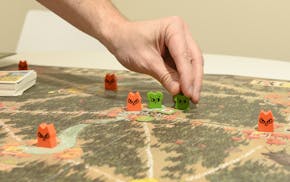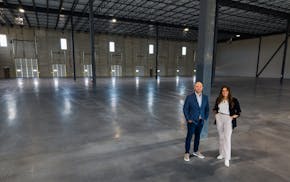Atlas Games tried to make its board games in the U.S. in the 1990s, but it was not economically feasible.
The Duluth company and many of its peers in the industry turned to China and built a sustainable economic model, one that is now threatened by President Donald Trump's 145% tariffs on Chinese goods.
"Our whole industry is reeling because we don't know, everything might change on a dime," said Atlas Games owner John Nephew said. "It's been a whirlwind of chaos and awfulness."
Under the current tariff plan, the companies could lose money. If they switch back to U.S. manufacturers, they know they will.
What's worse is the soaring costs come as tabletop gaming was having a renaissance of sorts. Sales climbed during the pandemic, and just a year ago analysts predicted the global market would more than double to $32 billion by 2032.
Atlas is not the only game company feeling "paralyzed" by the current economic situation.
Leder Games in St. Paul also is holding back on future investment to hold cash in reserve to ensure payroll can be covered, Patrick Leder, owner and CEO of Leder Games, said. The company has slowed printing considerably and will depend on its backstock.
Leder Games was printing an expansion for Arcs in China when tariffs started. A majority of those games will now be sent to the European Union, Leder said. Only 4,000 of the 20,000 printed will be available in the U.S.
Why the current model works
Atlas Games publishes role-playing, board and card games. Board games are the most affected because of the "ecology of manufacturing facilities" in China, a set-up unavailable throughout the rest of the world, Nephew said.
When Atlas tried to make games in the U.S., not only was the cost higher, but the quality was lower, Nephew said.
Atlas had to use five suppliers for a single game. Then Atlas employees assembled and shrink-wrapped the games by hand, he said.
While there are American board game manufacturers, Nephew said, most are sourcing components such as dice from China.
American production would likely mean similar games to those created by Avalon Hill in the 1970s that featured cardboard chips, a strong contrast to the plastic or metal pieces used today, Nephew said.
The higher cost of U.S. production just does not produce a product gaming companies can price competitively, he said.
Jonathan Silva, co-owner and CEO of WS Game Co., estimates a shift to the U.S. would result in a nearly 400% increase in costs. Plus, it would take upwards of three to five years of investment and testing to "even have a shot at success."
Factories must be experts at wood cabinet making, die-cast molding, injection molding and printing. And each supplier must also have experience producing children's products that pass safety testing, he said.
The Massachusetts-based company recently announced its first product launch at Target. The collection, in collaboration with Hearth & Hand, features classic games like Yahtzee and Scrabble housed in fabric-wrapped books with integrated game storage.
WS Game already has lost $16 million in revenue from canceled or paused orders because of tariffs. That translates to over 1 million games and more than $30 million in retail sales.
The company has adjusted its projections downward for over 1,000 independent game stores that it now won't be able to supply.
What's next if tariffs stay
Silva said the company is discussing alternative countries for production and other potential solutions with Target.
Atlas Games primarily sells through local game shops such as Source Comics and Games by James, Nephew said. Barnes & Noble is selling the Vicious Gardens game on a test basis.
Right now, board game pricing structures typically aim for a markup of five to 10 times the manufacturing cost. That allows for a retail price that pays the company, distribution costs and the retailer.
With the 145% tariffs on Chinese goods, the manufacturer or the companies would lose money.
"If a company was already having trouble, this would be the kind of thing that they'd say, 'Yeah, look, it's just not gonna get better soon,'" Nephew said. "It amplifies all the challenges that anybody already has."
As products get delayed, there will be less innovation in the industry, Silva said. Companies instead will focus on bestsellers to preserve capital and reduce risk, Silva said.
Nephew agreed. Board games typically have a long development time. One year would be "exceptionally fast" for a game to go from concept to reality, Nephew said.
"A lot of the diversity — the explosion of creativity that board games and tabletop games have seen — is not going to be sustainable with triple-digit tariffs," Nephew said.
Atlas has two expansion sets for its game Dice Miner in the works. The plan was to run a crowdfunding campaign during the summer to get people on board with the launch.
The basic design and some of the artwork is already completed, Nephew said, but the uncertainty around tariffs makes it difficult to plan for a specific timeline.
"We have maybe another month for things to change before we pull the plug, but we've already reached out to the designers and said we just don't think this is gonna happen," Nephew said.
All of WS Game's product development, manufacturing and importing is at a standstill, Silva said.
Silva and Nephew say the unpredictability of the economy this spring is paralyzing.
Trump said tariffs are necessary to reverse the trade deficit and encourage manufacturing expansion in the U.S.
Even if Trump lowered the tariffs on China, they would likely still be higher than companies in the games industry can absorb. Both Silva and Nephew agreed they could afford a 20% tariff.
Atlas Games could more easily roll that rate into the cost of goods, reflecting maybe a $1 or $2 increase in the retail price if needed, Nephew said.
But higher tariffs raise the prices of games beyond what the market will pay.
"I can't see that a game we originally planned to sell for $40, the market would accept it at $100," he said. "You can't expect people to accept those price hikes for literally the same game."
Atlas and WS Game in the meantime are both looking for ways to diversify revenue. Nephew said his company is exploring crowdfunding and print-on-demand options.
If the triple-digit tariffs hold, he might consider selling products only internationally instead of paying the duties to import them here.

After tepid state response, Wild and St. Paul scale back Xcel Energy Center renovation plans

Trump's China tariffs 'paralyzing' for Minnesota board game companies

How the loss of four federal grants is affecting the Science Museum of Minnesota

Target CEO Brian Cornell's pay declines 45% to $9.9M

